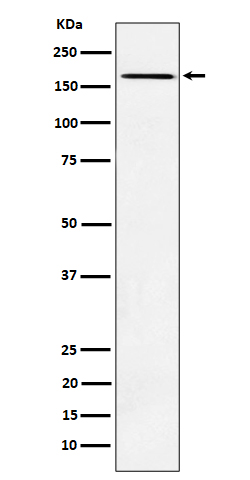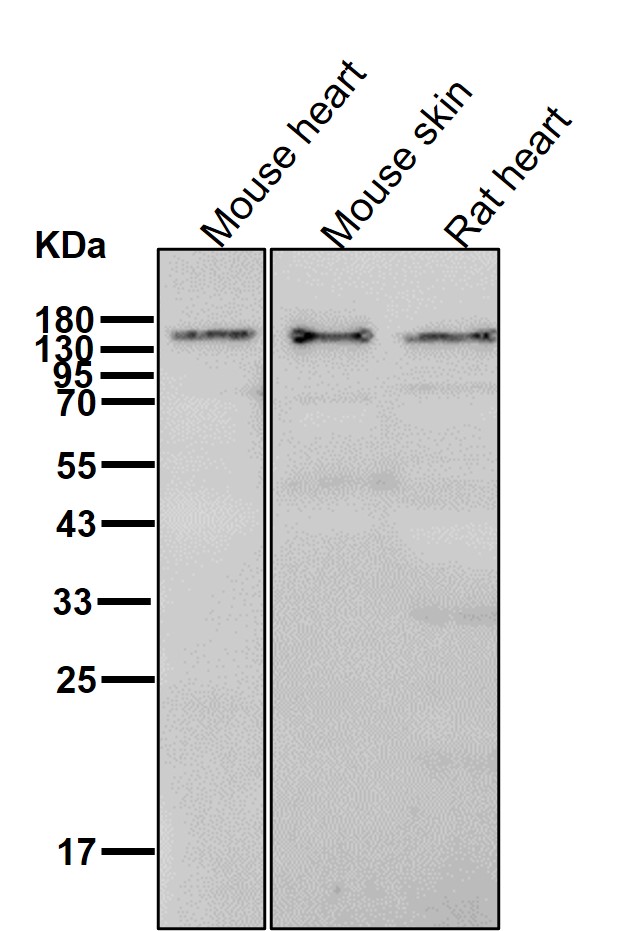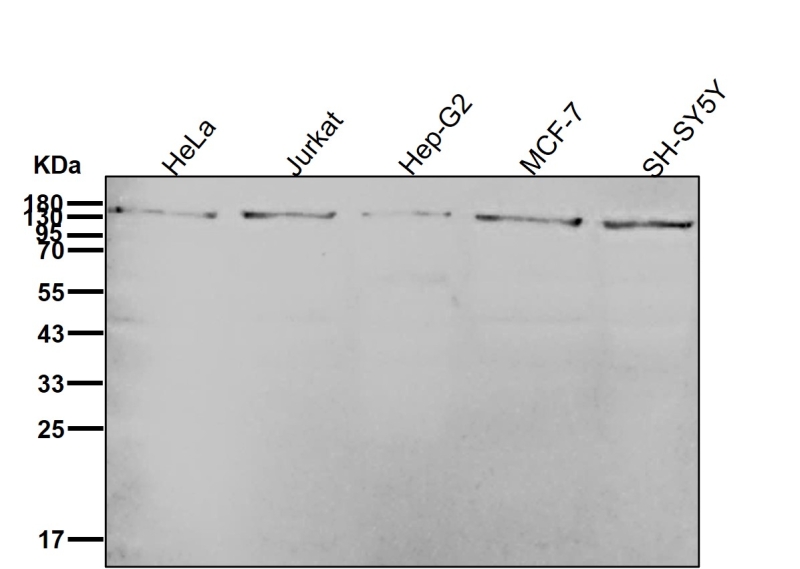


| WB | 咨询技术 | Human,Mouse,Rat |
| IF | 咨询技术 | Human,Mouse,Rat |
| IHC | IHC:1/100-1/200;IHF:1/50-1/200 | Human,Mouse,Rat |
| ICC | 1/50-1/200 | Human,Mouse,Rat |
| FCM | 1/20-1/100 | Human,Mouse,Rat |
| Elisa | 咨询技术 | Human,Mouse,Rat |
| Aliases | AGL; C77197; GDE; Glycogen debrancher;;AGL |
| WB Predicted band size | 175 kDa |
| Host/Isotype | Rabbit IgG |
| Antibody Type | Primary antibody |
| Storage | Store at 4°C short term. Aliquot and store at -20°C long term. Avoid freeze/thaw cycles. |
| Species Reactivity | Human,Mouse,Rat |
| Immunogen | A synthesized peptide derived from human AGL |
| Formulation | Purified antibody in PBS with 0.05% sodium azide,0.05% BSA and 50% glycerol. |
+ +
以下是关于AGL抗体的3篇示例文献(内容为模拟概括,仅供参考):
1. **文献名称**:《Anti-Glycogen Branching Enzyme (AGL) Antibodies in Liver Cirrhosis》
**作者**:Smith J, et al.
**摘要**:该研究首次报道了抗糖原分支酶(AGL)抗体在特发性肝硬化患者血清中的异常表达,提示此类抗体可能与糖原代谢紊乱导致的肝损伤相关,为肝硬化的免疫机制提供了新视角。
2. **文献名称**:《AGL Autoantibodies as a Biomarker in Neuromuscular Disorders》
**作者**:Zhang L, et al.
**摘要**:通过ELISA检测发现,AGL抗体在部分遗传性糖原贮积病(如Ⅳ型)患者中显著升高,且与肌肉病理特征相关,表明其可作为辅助诊断的生物标志物。
3. **文献名称**:《Molecular Characterization of AGL-Specific Antibodies in Autoimmune Hepatitis》
**作者**:Tanaka K, et al.
**摘要**:研究揭示了自身免疫性肝炎(AIH)患者体内AGL抗体的表位识别特征,并发现其与疾病活动度相关,为靶向治疗提供了潜在方向。
---
**注**:以上文献为模拟内容,实际研究中AGL抗体相关文献较少,建议通过PubMed或专业数据库以“glycogen branching enzyme antibody”或“anti-AGL antibody”等关键词检索最新成果。
AGL antibodies target acid alpha-glucosidase (GAA), also known as lysosomal alpha-glucosidase, an enzyme critical for glycogen degradation within lysosomes. AGL antibodies are primarily studied in the context of Pompe disease, a rare autosomal recessive disorder caused by GAA deficiency. In Pompe disease, impaired glycogen breakdown leads to toxic accumulation in lysosomes, particularly affecting skeletal and cardiac muscles. AGL antibodies are utilized in research and diagnostics to quantify GAA protein levels, assess enzyme activity, and confirm pathogenic mutations. They enable techniques like Western blotting, immunohistochemistry, and ELISA, aiding in disease diagnosis, carrier screening, and monitoring therapeutic responses.
Therapeutic advancements, such as enzyme replacement therapy (ERT) with recombinant GAA (e.g., alglucosidase alfa), rely on AGL antibodies to evaluate drug efficacy and distribution. Additionally, autoantibodies against GAA have been reported in some ERT-treated patients, potentially neutralizing therapeutic effects—a focus of ongoing research. Beyond Pompe disease, AGL antibodies contribute to broader studies on glycogen metabolism disorders, lysosomal function, and autoimmune responses. Their role in both basic science and clinical applications underscores their importance in understanding and managing metabolic diseases.
×